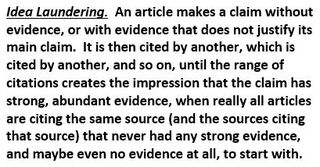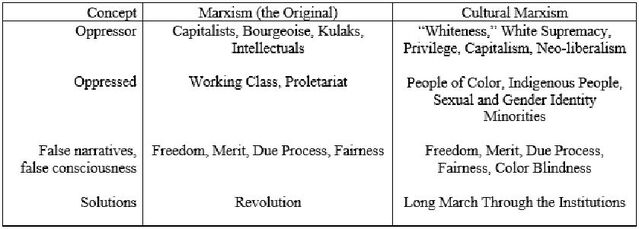Media
Cultural Marxism: Far Right Antisemitic Conspiracy Theory?
Who is engaging in propaganda and misinformation?
Posted March 8, 2021 Reviewed by Jessica Schrader
Wikipedia had an entry on “Cultural Marxism” but it redirects the reader to Cultural Marxism Conspiracy Theory. I read on, and discovered that, according to Wikipedia, Cultural Marxism is “a far-right antisemitic conspiracy theory.” This really caught my attention because I have been doing research on conspiracy theories recently and antisemitism for over 10 years now. In addition, as a Jew I have a personal interest in getting a better sense of who might be gunning for me and mine.
What I discovered was deeply disturbing, but not for the reasons Wikipedia would have us believe. First, let’s define terms.
A conspiracy is a secret plot by two or more powerful actors to accomplish some nefarious purpose.

Although conspiracy theory can be defined in a neutral, scientific manner, it is usually used as a pejorative term of dismissal that casts the belief as part of some extremist, irrational, deluded fringe who erroneously attribute events and developments they consider bad to conspiracies. It is clear that Wikipedia is using it in this sense. In addition to referring to it as “far-right” (extremism), it says:
Scholarly analysis of the conspiracy theory has concluded that it has no basis in fact and is not based on any actual intellectual tendency.
Therefore, in this post, I use it as a term of dismissal, as used in the Wikipedia article.
Marxism refers to a set of loosely connected ideas and claims. I will try to distill these terms to their core, essential features that are relevant to this essay.
Some key elements of Marxism are:

The world is divided into oppressors and oppressed.
Narratives regarding freedom and merit constitute false narratives, and, if accepted by those on the lower end of socioeconomic status, false consciousness. Their main function is to justify the manner in which the oppressed are exploited.
Revolution is required to overthrow the oppressors.
In the name of equality, it rejects freedom.
When Marxists have seized control over countries, because of the rejection of freedom, they have often produced economic devastation and oppression, including mass murder, on unimaginable scales.
Cultural Marxism, some argue, is the 21st-century evolution of Marxist ideas in which racial/cultural/ethnic identities have replaced class as the key elements of oppressor versus oppressed. Rather than proletariat vs. bourgeoise, we have historically “minoritized groups” vs. “whiteness.”

Although we saw proto-revolutionary violence in places like Seattle and Portland in the summer of 2020, in general we do not have revolution—but we do have “the long march through the institutions.” The “long march through the institutions” refers to a neo-Marxist strategy developed in the 1960s based largely on ideas of the very same schools of thought often characterized as Cultural Marxism. The idea is to undermine capitalist democracies by infiltrating its institutions (media, education, academia, tech, etc.) with committed activists. See sources on cancel culture, the extreme left skew of academia, and the rise of critical race theory (plausibly described as a form of “cultural Marxism”) in K-12 education and judge for yourself whether “the long march through the institutions” is a real thing or a conspiracy theory.
The Wikipedia Article Amplifies Academic Propaganda Camouflaged as Scholarship
Wikipedia cites “scholarly” articles (such as here and here) and mainstream and online media essays in support of its claim that Cultural Marxism is an alt-right conspiracy theory. To be sure, most of these articles make a credible case that there have been instances where the term has been used as an antisemitic conspiracy theory. But if one does a deep dive into those it claims are doing so, it is sometimes quite difficult to find evidence of antisemitism or conspiratorial thinking. For example, the Wikipedia article correctly traces the rise and popularity of the term to some conservative writers of the 1990s and early 2000s, such as Pat Buchanan and William Lind. I do not know whether folks such as these are antisemitic, but Wikipedia actually gets their views right when it quotes a political scientist as describing their views this way:
“… the threat does not come from the migrant or Jew because he is a migrant or Jew. For Lind, the threat comes from the Communist ideology.”
Criticizing an ideology is not antisemitic. They may or may not be correct, and it is fair to characterize their views as rightwing. Ideas and political movements are subject to criticism no matter who promotes them. Indeed, in this article, Lind argues to defend “Judeo-Christian culture”—again, politically conservative but not antisemitic.
The Wikipedia article includes links to a long list of people, mostly on the right, who have railed against Cultural Marxism. It identifies Jordan Peterson as one. It is not even clear that Peterson is rightwing, but, regardless, Peterson has never written anything antisemitic. In this blog, he debunked antisemitic conspiracy theories.
To be sure, some writers have used the fact that Jews were overrepresented among both the early Bolsheviks and the early critical theories (approaches that adapted Marxist critiques to the early 20th century) to condemn Jews in general as part of a conspiratorial network corrosive to democracy and Western culture. In his book, The Culture of Critique, Kevin MacDonald casts critical theory as part of a “conflict of interest between Jews and non-Jews” (preface), as if all Jews have the same interests, which is so preposterous as to not warrant any effort to debunk. This article by the Southern Poverty Law Center reports that, in 2002, Lind gave a speech at a conference organized by an antisemite and attended by a slew of Holocaust deniers. After referring to an intellectual movement that was supposedly poisoning American culture, he stated, "These guys were all Jewish."
Nonetheless, the fact that some bad actors have drawn on these ideas to advance antisemitism is a comment on those bad actors—not on the ideas themselves. This article in Tablet, which describes itself as an outlet for Jewish thought, news, and culture declares (correctly, in my view):
"The term ["cultural marxism"], in other words, has perfectly respectable uses outside the dark, dank silos of the far right.
The article continues:
It is a short step from Gramsci’s “hegemony” to the now-ubiquitous toxic memes of “patriarchy,” “heteronormativity,” “white supremacy,” “white privilege,” “white fragility” and “whiteness...It is a short step from the Marxist and cultural Marxist premise that ideas are, at their core, expressions of power to rampant, divisive identity politics and the routine judging of people and their cultural contributions based on their race, gender, sexuality and religion — precisely the kinds of judgments that the high ideals of liberal universalism and the foremost thinkers of the Civil Rights Era thought to be foul plays in the game. And it is a short step from this collection of reductive and simplistic conceptions of the “oppressor” and the “oppressed” to public shaming, forced resignations and all manner of institutional and corporate policy dictated by enraged Twitter mobs, the sexual McCarthyism of #MeToo’s excesses, and the incessant, resounding, comically misdirected and increasingly hollow cries of “racist,” “sexist,” “misogynist,” “homophobe,” “Islamophobe,” “transphobe” and more that have yet to be invented to demonize all those with whom the brittle hordes partaking in such calumnies happen to disagree."

Further, gentle reader, please do not misconstrue my point. I am not arguing "You can't believe everything you read in Wikipedia," though of course that is true. The Wikipedia article is based on academic scholarship and mainstream media news reports. The primary sources are the far more serious problem because they have an air of scholarly or journalistic credibility that, at least in this case, is wholly unjustified.
Is Cultural Marxism a Reasonable Shorthand for the New Ideology?

Empirical Evidence
We recently posted a report describing a study of online antisemitic conspiracy theories. To be sure, such theories are alive and well in extremist communities on social media. They exist on both the left and the right, as this chart from that report shows:

We identified memes and code-words associated with online antisemitic conspiracy theories. For example, George Soros, “puppet masters,” and “globalists” were commonly associated with such theories. You know what we did not find? We found no evidence that “cultural Marxism” was associated with online antisemitic conspiracy theories.
Bottom Lines
1. Antisemitic conspiracy theories are a real thing.
2. Cultural Marxism is a term mostly used to describe an ideological movement, not a conspiracy theory. It did not appear to be associated with online antisemitic conspiracy theories in our recent analysis of online extremism and antisemitism.
3. Some antisemitic bad actors do use the term as a way to condemn Jews in general. However, many of the most prominent sources that have used the term are right-wing, but have not used it as an antisemitic conspiracy theory.
4. The Wikipedia article, and others like it, are plausibly interpreted as propaganda seeking to deflect criticism of an illiberal left-wing movement that some call Cultural Marxism by denigrating those criticisms as constituting an antisemitic conspiracy theory, when they are not.
Recommendations
I do not recommend using the term "Cultural Marxism" because I think some bad actors have used the term in pernicious ways, and the barrage of critiques by leftwing media and academic writers has muddied the waters by lumping in positions that are rightwing but neither antisemitic nor conspiracy theories with those of genuinely antisemitic bad actors.
One can refer to this modern, evolved form of radicalism in other ways, such as the successor ideology, wokism, or the illiberal left. Although none capture the simple manner in which the successor ideology is largely an updated version of Marxism that has largely exchanged culture/ethnic and other minoritized identities for the original emphasis on class, it avoids having to deal with some of the excess baggage that comes with Cultural Marxism.
When reading sources that refer to Cultural Marxism, you can usually tell whether it is antisemitic propaganda, say, if it explicitly refers to Jews or implies that Jews as a group have some sort of vested interest in or are engaged in conspiratorial plots to advance radical ideas. Peppering condemnations of Cultural Marxism with known antisemitic dog whistles (Soros, globalists, bankers, etc.) is also a tell. On the other hand, if the source exclusively criticizes or condemns an ideological movement and refers to it as Cultural Marxisim, that source may still be wrong, but they are neither antisemitic nor promoting a conspiracy theory.




